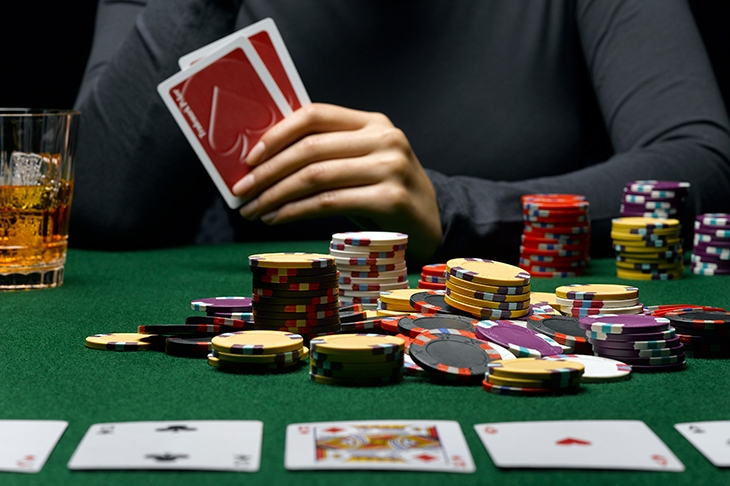This is not a rip-roaring, gonzo gambling adventure. By page 66 this cautious, thoughtful author has still never played a hand of poker in her life. She has read, re-read, dissected and annotated poker textbooks. She has scribbled notes while trying to keep up with her power-walking mentor, the poker legend Erik Seidel, as he tells her she’ll need to develop the ability to be reckless. This is a swot’s progress, a fish-out-of-water experiment. It’s hard to imagine her taking on, say, Devilfish in Vegas. As she finally joins a charity tournament on page 115, I’ll admit to thinking, this had better go somewhere.
And it does. Within 18 months she has turned pro, recruited by Poker Stars after winning an $84,000 trophy and another $60,000 game. She becomes one of the top five women tournament players of 2018. The wager paid off: Maria Konnikova asked if diligence, intelligence and training could conquer chance, bluff and mind games — and the answer was a triumphant yes. A welcome story for a generation questioning the ‘work hard and prosper’ promise of the American dream.
Konnikova is a popular psychology writer (the New Yorker, Scientific American) who studied under the most prominent exponents of the genre: Stephen Pinker at Harvard and Walter ‘Marshmallow Test’ Mischel whe supervised her PhD at Columbia. Lumpy academic tags — ‘the description-experience gap’, ‘the ludic fallacy’, ‘internal vs external locus’ — are expertly integrated here, concealed vegetables in her easily digestible prose.

Her interest was sparked by the unfairness of life — idiopathic illness striking at random, her husband’s start-up failing, and so on. ‘I wanted to tame luck, through poker,’ she writes. Based on John von Neumann’s game theory, her PhD experiment mocked up a city trading model and showed that a ‘blank slate’ beginner who learns cautiously is better than a falsely confident pro: hence her determinedly slow start at poker.
As the book picks up, she goes deep into gaming culture, from Monaco to Macau, asking why as a species we find probabilistic thinking so difficult. Each throw of the die is just as likely to have the same outcome as the last, but our ‘weird intuition’ tells us we are less likely to flip heads four times in a row. We are confusing large number samples with small, but our intuition is stubborn — and indulged, as Konnikova learns from the game designer Frank Lantz, head of New York University’s Game Centre. ‘In video games where there are random events — things like dice rolls — they often skew the randomness so that it corresponds more closely to people’s incorrect intuition.’ Poker, on the other hand, doesn’t pander. ‘Poker pushes you out of your illusions.’
Konnikova’s first book, the worldwide hit Mastermind: How to Think Like Sherlock Holmes, was all about honing one’s powers of observation. Here, she is herself observed, for many hours as she plays, by an organisation called the Nonverbal Group, whose business is gathering body language data. A radio frequency identification reader notes the value of her cards, and a team codes the ‘surrounding behaviours’ — the shrugs, the eye rolls? Not so much.
It turns out we’re able to make all sorts of accurate predictions about behaviours if we ignore the cues we normally love to look at (faces) and instead look at bodies. People can predict whether someone is about to co-operate with them or compete with them based on how they reach for a Lego piece…
Konnikova is told that she’ll need to develop the ability to be reckless
It’s our hands that give our game away.
Like many, Konnikova checks marginal cards more frequently, acts with dexterous fluidity when certain and puts her hands over her cards when uncertain. What’s the antidote? Not to move in a schematised, robotic fashion, as any break with routine becomes immediately noticeable. Instead she’s simply advised to take time to think before every physical move, which helps ‘cool’ those impulsive giveaway gestures.
Seidel, one of the world’s top players, is a supportive presence in the book, part zen master, part dream dad: humble, tactful, open-minded. When Konnikova shows him evidence that egg-white omelettes don’t alter cholesterol, he never orders one again. His character is oddly transparent. Konnikova nicknames him ‘the Dragonfly’ (dragonflies kill 95 per cent of their prey, cheetahs only 58 per cent). He warns her off ‘degen’ — degenerate gambling habits — and helps her become impervious to backchat.
In time she sheds what she calls her female socialisation and brings aggression into her game; because in poker, as in life, there is a ‘false sense of security in passivity’. ‘You think that you can’t get into too much trouble — but really, every passive decision leads to a slow but steady loss of chips.’ Lean in, in other words. Or, as they used to say, nothing ventured, nothing gained. The eternal verities are worth repeating anew, although there is something a little strange about reading so much about the latest scientific research only to end up having it all summarised by quotations from Kipling: ‘If you can make a heap of all your winnings/ And risk it on one turn of pitch and toss…’ The readiness to go all in, in love, in life or in a game, is everything. Konnikova goes for it, and wins.






Comments